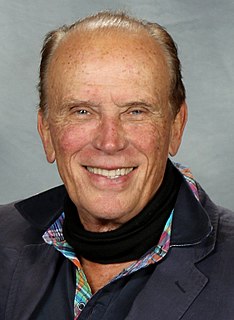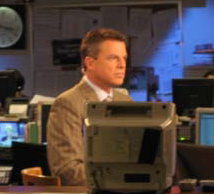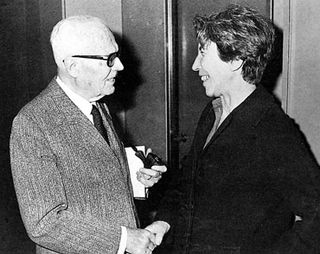A Quote by Charles Bukowski
Writing is something that you don't know how to do. You sit down and it's something that happens, or it may not happen. So, how can you teach anybody how to write? It's beyond me, because you yourself don't even know if you're going to be able to. I'm always worried, well, you know, every time I go upstairs with my wine bottle. Sometimes I'll sit at that typewriter for fifteen minutes, you know. I don't go up there to write. The typewriter's up there. If it doesn't start moving, I say, well this could be the night that I hit the dust.
Related Quotes
I think I sit down to the typewriter when it's time to sit down to the typewriter. That isn't to suggest that when I do finally sit down at the typewriter, and write out my plays with a speed that seems to horrify all my detractors and half of my well-wishers, that there's no work involved. It is hard work, and one is doing all the work oneself.
If you're going to be a writer you should sit down and write in the morning, and keep it up all day, every day. Charles Bukowski, no matter how drunk he got the night before or no matter how hungover he was, the next morning he was at his typewriter. Every morning. Holidays, too. He'd have a bottle of whiskey with him to wake up with, and that's what he believed. That's the way you became a writer: by writing. When you weren't writing, you weren't a writer.
When I sit down at the typewriter, I write. Someone once asked me if I had a fixed routine before I start, like setting up exercises, sharpening pencils, or having a drink of orange juice. I said, "No, the only thing I do before I start writing is to make sure that I'm close enough to the typewriter to reach the keys."
Here we are signing autographs for people who essentially know know how to write their name and are functionally literate. But if you cease to teach cursive writing, how does one know how to, I don’t know, replicate the Declaration of Independence? Or the orations of Cicero? Is it just going to be on the internet?
I'll think about something else. I'll just sit quietly. If I could sit still. If I could sit still, maybe I could read. Oh, all the books are about people who love each other, truly and sweetly. What do they want to write about that for? Don't they know it isn't true? Don't they know it's a lie, it's a God-damned lie? What do they have to tell about that for, when they know how it hurts?
Well, first you have to love writing. A lot of authors love having written. But I enjoy the actual writing. Beside that, I think the main reason I can be so prolific is the huge amount of planning I do before I start to write. I do a very complete, chapter-by-chapter outline of every book I write. When I sit down to write, I already know everything that's going to happen in the book. This means I've done all the important thinking, and I can relax and enjoy the writing. I could never write so many books if I didn't outline them first.
When you write something you know, you're making a story that will work, whether or not there's bits taken. It's always funny to me when people say, 'Well, it's clearly autobiographical,' and I say, 'Well, how do you know my autobiography?' Certainly, there are things that are connected, but I just think it's a very interesting assumption.
If you make a suggestion and [musicians] don't know what you mean, you have to be able to do it yourself. I often sit down on drums and show 'em just exactly what I want. And I do it and then say, "How do you do that?" It's because I know how it looks, I know what I want to hear, and I don't drop or rush any tempo. It ain't in my body, it ain't in my nephew's body.
I think a lot of the writing, you know, I write is just kind of like that where, you know. I write exactly how I'm feeling sometimes, and hardships that I'm going through. But I always end up, like the choruses are like, "God, You are good. God, you're faithful. You know, I know You understand, You're right here by my side." All these different things. And I just say very personal experiences that I've been through. I mean, it's not always detrimental thing.
My vocation is to write and I have known this for a long time. I hope I won't be misunderstood; I know nothing about the value of the things I am able to write. I know that writing is my vocation. When I sit down to write I feel extraordinarily at ease, and I move in an element which, it seems to me, I know extraordinarily well; I use tools that are familiar to me and they fit snugly in my hands. But when I write stories I am like someone who is in her own country, walking along streets that she has known since she was a child, between walls and trees that are hers.






































